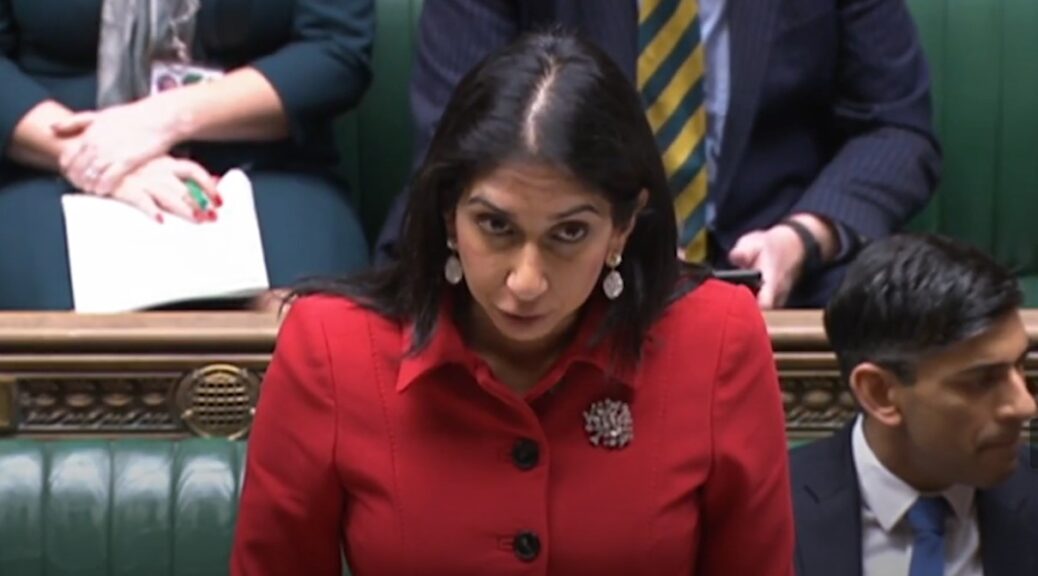This post is adapted from my Indy Voices article of the same title originally published on 13/03/23
Upon unveiling new plans to deter people from crossing the Channel in small boats, Suella Braverman claimed that 100 million people could already be on their way to seek asylum in the UK.
In her speech to the commons, the home secretary claimed: “There are 100 million people around the world who could qualify for protection under our current laws. Let’s be clear. They are coming here.”
An article she wrote the following day repeated the claim and went further suggesting that there were “likely billions more” eager to come to the UK if possible.
In reality, just 85,000 people have arrived in the UK in small boats across the Channel since 2018 – just 17,000 a year on average.
Even the relatively high 45,000 people who arrived in the UK last year to seek asylum by crossing the channel on small boats pales into comparison – at just 0.045 per cent of Braverman’s touted 100 million figure. In total, around 90,000 people applied for asylum in the UK in 2022.
To set the record straight on the numbers, of the 100 million people that the United Nations High Commissioner for Refugees estimates are displaced around the world, only around a quarter have actually left their home country.
Estimates vary, but around three-quarters of displaced people who do leave their own country remain in a neighbouring country. Surveys consistently demonstrate that the majority of refugees would like to return to their homes as soon as it is safe for them to do so.
Historically, we have relatively fewer asylum seekers applying to the UK, compared to our population size, than many of the EU nations. In 2021, there were around nine asylum applications per 10,000 people in the UK.
Across the rest of the EU, this figure was 14 applications per 10,000 residents, placing the UK below the average in 16th place. In 2022 the UK received 75,000 asylum applications. Germany received almost 250,000.
Despite these facts, the home secretary sees it to her advantage to overinflate the potential scale of the number of people arriving in the UK. She believes that the potential threat posed by this hypothetical deluge justifies legislation which, many believe, is in contravention of international law.
ADVERTISING
The huge numbers being bandied about are hard for us to get a handle on. Many people struggle to visualise the difference between thousands, millions and billions. Even if they know that a billion is a thousand times more than a million and a million is a thousand times more than a thousand, when numbers get really large they can go beyond the scale of things we are able to relate to. Everything just seems big.
One way to comprehend the difference is to think about time – a phenomenon which we experience both on very short and very long scales. A hundred thousand seconds is a little over a day. You can go 24 hours without eating no problem.
A million seconds is about 11.5 days. Not eating for that long would push most people to the limits of their willpower. A billion seconds is about 35 years. Fasting for half a lifetime is patently impossible. The scale of the problem changes significantly as the numbers ramp up.
Here’s another way of thinking about it. If I give you £1,000 a day it will take just 100 days for you to amass £100,000. In three years you’ll become a millionaire. To become a billionaire, however, will take 2740 years.
When we compare the 100 million displaced people in the world to the fewer than 100,000 people who claimed asylum in the UK last year, at less than 0.1 per cent the number of asylum seekers doesn’t seem so large.
When we start to place the figures in context, it seems possible that by overplaying the scale of the situation to the public – by bandying around figures of hundreds of millions or even billions – Braverman’s tactic runs the risk of backfiring, making the scale of current asylum applications look eminently manageable.
Even the 45,000 people who came to Britain to claim asylum via boats across the channel represent only around 0.07 per cent of the current population of the UK.
Even when placed in context though, we must be careful not to focus too heavily on the numbers which have grabbed the headlines. We must remember, at its heart, that this story is not about numbers. It is about people. Often desperate people fleeing the traumas of their past and hoping to build a better life for themselves.
By denying them the protections afforded under international law; by breaking the European convention on human rights, the UN convention on refugees and the universal declaration of human rights – all of which the UK was a founding member of – we are betraying the legacy that our country fought so hard to secure.
